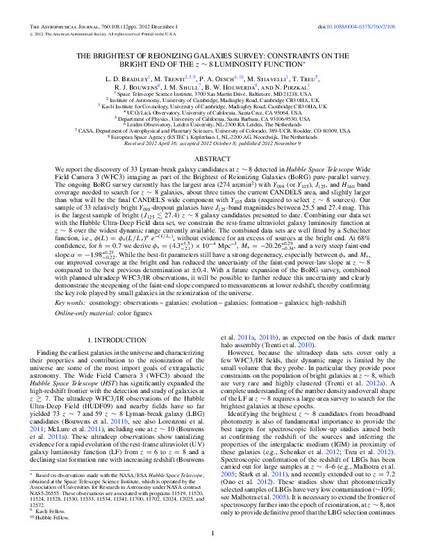
We report the discovery of 33 Lyman-break galaxy candidates at z ∼ 8 detected in Hubble Space Telescope Wide Field Camera 3 (WFC3) imaging as part of the Brightest of Reionizing Galaxies (BoRG) pure-parallel survey. The ongoing BoRG survey currently has the largest area (274 arcmin2) with Y098 (or Y105), J125, and H160 band coverage needed to search for z ∼ 8 galaxies, about three times the current CANDELS area, and slightly larger than what will be the final CANDELS wide component with Y105 data (required to select z ∼ 8 sources). Our sample of 33 relatively bright Y098-dropout galaxies have J125-band magnitudes between 25.5 and 27.4 mag. This is the largest sample of bright (J125 27.4) z ∼ 8 galaxy candidates presented to date. Combining our data set with the Hubble Ultra-Deep Field data set, we constrain the rest-frame ultraviolet galaxy luminosity function at z ∼ 8 over the widest dynamic range currently available. The combined data sets are well fitted by a Schechter function, i.e., φ(L) = φ∗(L/L∗) α e−(L/L∗) , without evidence for an excess of sources at the bright end. At 68% confidence, for h = 0.7 we derive φ∗ = (4.3+3.5 −2.1) × 10−4 Mpc−3, M∗ = −20.26+0.29 −0.34, and a very steep faint-end slope α = −1.98+0.23 −0.22. While the best-fit parameters still have a strong degeneracy, especially between φ∗ and M∗, our improved coverage at the bright end has reduced the uncertainty of the faint-end power-law slope at z ∼ 8 compared to the best previous determination at ±0.4. With a future expansion of the BoRG survey, combined with planned ultradeep WFC3/IR observations, it will be possible to further reduce this uncertainty and clearly demonstrate the steepening of the faint-end slope compared to measurements at lower redshift, thereby confirming the key role played by small galaxies in the reionization of the universe.
Bradley, L. D., et al. "The Brightest of Reionizing Galaxies Survey: Constraints on the Bright End of the z ~ 9 Luminosity Function." 2012. The Astrophysical Journal 760(2): 12 pp.

Copyright 2012. The American Astronomical Society. All rights reserved.
https://doi.org/10.1088/0004-637X/760/2/108